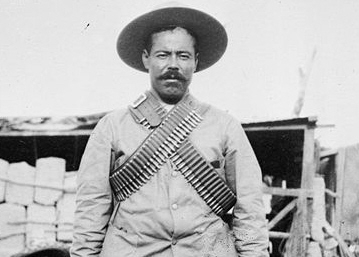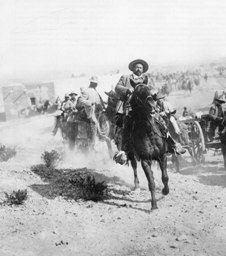Pancho Villa was a bandit turned hero from the Mexican Revolution, and stood for the values of generosity and equal rights and freedom for the poor. His tale began when he was sixteen years old and he fled to the mountains after killing the son of the landowner who raped Pancho's younger sister. in fear for his life, Pancho Villa joined a group of bandits in the mountains and became a champion for the poor. Soon met Francisco I Madero and made the "historical transition from bandidos to revolucionarios," (Cummings). His Robin Hood like actions helped him become part of a legend that's still told in Mexico to this day. His courage and resourcefulness as a military leader as well as his generous nature earned Pancho Villa the support of the poor and tittle of hero in Mexico during the uncertain times of the revolution.
 |
| (http://blogs.phoenixnewtimes.com/bastard/2009/02/skull_and_bones_pancho_villas.php ()) |
By attacking the rich and giving his spoils to the poor, he helped the underrepresented poor during the Mexican revolution. Most Americans, at the time, thought that Pancho Villa was a crazed bandit who used the revolution to accomplish his personal goals. Some believed he is a German agent sent to persuade the Mexican government to join their side during World War I. Pancho Villa was a man who "spent his life fighting the wealthy Mexican landowners and attempt[ed] to liberate the impoverish[ed] peasants"(Rosenberg). Despite his bad reputation in the US, he spent his entire life fighting against the injustice of his country's government and the rich. He accomplished this by robbing the rich and giving the spoils to the poor. He also modernized the city of Juarez by "increas[ing] the food supply for the populace, improve[ing] the water supply, and repair[ing] the power plant." ("Pancho Villa."). Villa wanted the inhabitants of the city to live better lives so he modernized the city and made sure that it was a better place than when he arrived. These, and his other deeds made him a hero to the poor and an enemy to the rich but, his generosity wasn't the only trait that help him achieve hero states.
It took courage for Villa to lead against the Mexican army with only a band of commoners who had no experience in warfare or weaponry, let alone win decisive victories. A prime example of Villas courage is when he fought against a traitor in the revolution. "Villa[was Madero's] only remaining ally. Along with General Victoriano Huerato, Villa fought and defeated Orozco [the traitor]," (Rosenberg). When Madero was in trouble he knew he could rely on Villa to help him; Villa's courageous acts in battle allowed him to defeat Orozco and exile him to the states. This also shows that Villa never gave up on his cause even when his allies betrayed him. Another portrayal of courage was when he attacked the city of Zacatecas. "In May of 1914 the way was clear for an attack on the strategic town of Zacatecas where there was a major railway junction. a huge military victory for Villa,"( Rosenberg). What Villa did was a huge feat considering that only a few hundred out of 12,000 survived the battle. This victory also proves that Villa was a tactical genius when it comes to warfare. his courageous acts was one of the reasons he managed to hold his own for a long time after he was abandoned by his allies.
 |
| (http://frontierpartisans.com/353/pancho-villa-%E2%80%94-fourth-horseman-of-the-mexican-apocalypse-%E2%80%94-part-i/ ()) |
Villa's courage and generosity made him a force to be reckoned with among the rich and a great revolutionary for the poor in a time when Mexico was in one huge bloody civil war. A closer look to Villa's criminal past and record reveals he was not really a criminal because his actions and crimes made him the Mexican Robin Hood. His tactical genius was a reason why many of the revolutionary's victories happened during the early and middle stages of the revolutions. After he was murdered by assassins who were hired by Villa's enemies, Villa left a huge legacy. He is glorified in Mexican songs and folklore. Though his story is misunderstood by some, he is romanticized by many. Pancho Villa may have been a bandit and a common cattle rustler however, had he not joined the revolution when he was offered the opportunity, Mexico would be in more trouble than it is in now.
Works Cited
Cummings, Joe. "Francisco "Pancho" Villa." : Mexico History. Mexconnect, 1 Jan. 2006. Web
08 May 2012.
Goldfarb, Sheldon, and Goldfarb Sheldon. "Pancho Villa." Great Lives From History: Notorious
Lives (2007): 1. Biography Reference Center. Web. 8 May 2012.
"Pancho Villa." Dictionary of Hispanic Biography. Gale, 1996. Gale Biography In Context.
Web. 8 May 2012
Rosenberg, Jennifer. "Pancho‚ Villa." About.com 20th Century History. About.com. Web. 08
May 2012.
Page created on 5/19/2012 12:00:00 AM
Last edited 5/19/2012 12:00:00 AM
